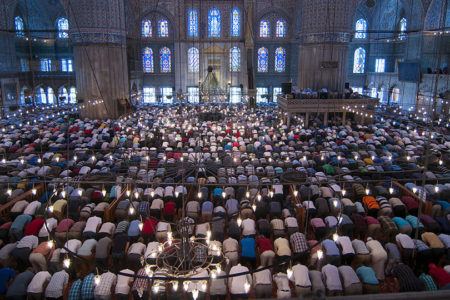Presbyterians Come Out of the Closet
Yes, it is true that the Presbyterian Church (USA) manhandled Israel at its 216th General Assembly last summer. Not that the denomination has been soft on the Jewish state, its leadership, or citizenry in the past. But what made this occasion interesting was the decision to “come out of the closet” and cast its animosity in an official document so no one would miss the point.
The Reverend Victor Makari, the church’s liaison to the Middle East, made its intentions clear by stating that, because Israel had not changed its policy toward the Palestinians, the church was compelled to “send a clear and strong message.” If such was the intent, the Presbyterians achieved their purpose.
The Presbyterian Church (USA) is the largest of the Presbyterian denominations, with approximately 2.5 million members, 11,200 congregations, and 21,000 ordained ministers. It lays claim to an illustrious history dating back to the 16th century and the Protestant Reformation.
The implication, therefore, is that when PCUSA speaks, the church has spoken which, of course, is not the case. There are obviously many thousands of Presbyterians, in and out of the PCUSA, with more amicable attitudes toward Israel and the rights of the Jewish people to live in peace and security in the land of their fathers.
So what’s the beef about the decision to speak out? And what did the Presbyterian General Assembly, by a vote of 431 to 62, approve?
1. Gathering data to support selective divestment of holdings in multinational corporations doing business in Israel/Palestine.
This divestiture involves its nearly $8 billion portfolio, excluding those companies profiting from sale of products and services that cause harm to Palestinians or Israelis or both. Fact: Israel is the target, and the only country tagged for divestment.
2. Condemning Israel’s security fence, which, in the view of the delegates, annexes land without negotiation.
Never mind that over the past four years of the Palestinian war on Israel, 2,000 Israelis, Americans, and others have died from suicide attacks. These have been largely thwarted in areas where the fence now exists. Never mind the reason why the fence was built or that the Palestinians have resolutely rejected opportunities to negotiate with Israel.
3. Identifying Israel as espousing policies comparable to those of South Africa under the former apartheid regime.
This position conveniently overlooks the fact that more than 1 million Arabs hold full Israeli citizenship plus representation in Israel’s ruling body, the Knesset.
4. Disavowing Christian Zionism as a legitimate theological stance.
It is ironic that the very week the PCUSA was passing its resolutions, the Roman Catholic Church signed a document equating anti-Zionism with anti-Semitism And what is the definition of Zionism? Basically, it is the belief that the Jewish people have a right to a secure homeland in Eretz Yisrael, sanctioned under international law. For Zionist Christians, that right is, without reservation, a God-ordained possession consistent with irrevocable biblical promises. In addition, though some seem to forget it, Israel is a legitimate state recognized under international law. The missing element at this juncture is secure, recognized boundaries.
5. Insisting on the Palestinians’ right of return to Israel proper.
Implementing this position would effectively dismantle the Jewish nation by turning it into another state with a Palestinian majority, such as Jordan.
Planking for the Anti-Israel Platform
Those five points represent the essence of the Presbyterians’ Middle East Manifesto. Details can be found in works of liberal Presbyterian Middle East “experts,” such as Wheaton Professor Gary Burge who, in lock-step with his denomination, has taken it on himself to make the case for the Palestinians and condemn the Israeli “Goliath” in the latest revision of his 1993 book on the subject, now titled Whose Land? Whose Promise?
Burge terms Christian Zionism a “territorial religion” focusing on land rights: “But it [the land] no longer has an intrinsic part to play in God’s program for the world.”1 This statement is the crux of the issue between Zionist evangelical Christians and the proponents of Replacement Theology.
In his book, Burge charges Israel with discrimination, stealing land, stealing water, destroying villages, genocide, and an innumerable host of human rights violations against the Palestinians. With regard to the flight of Palestinians from Bethlehem, he makes this observation:
The same is true of traditionally Christian Arab cities such as Bethlehem and Ramallah….Frustration with the devastated Palestinian economy, anger with the lack of freedom, and hopelessness about the future have led many to simply leave.2
The villain, predictably, is Israel. But what is not said is that the Arab-Christian exodus began following Yasser Arafat’s takeover of Bethlehem. Before then, local Christian Arabs and Christians from abroad had always enjoyed cordial and economically profitable relationships. But after Arafat took over, the city became a prime center for exporting terrorism and suicide attacks against innocent Israelis, not to mention militant Muslim thugs who terrorize Arab Christians and business men, causing them to leave.
In his book, Burge gives Yasser Arafat, and homicide bombers and their ilk, a virtual pass in favor of vilifying Israelis and their Christian supporters who happen to hold eschatological views contrary to his.
One might say that the capstone of this mindset is the lionization of several dubious characters for no explicable reason. Consider this:
Moreover today a new leadership is just over the horizon. Two young men in their thirties now rule in Damascus and Amman. In Iraq, Saddam Hussein’s eldest son, Odai Hussein, won a seat in the Iraqi Parliament (March 28, 2000), will likely become the speaker of the house, and is the heir apparent.3
In light of later information concerning Odai, father Saddam, and his brother Qusay, one might say the author could be charged with flawed judgment. But this is the core of the issue between Zionist Christians and liberals who make their case based on reckless abandon more given to castigating their opponents than to supporting the balance and, tolerance they claim to cherish.
Setting the Record Straight
A consistent strain among detractors of Christian Zionists is that our motivation for a relationship with Israel and the Jewish people is self-serving; manipulative; and, above all, fanatically misguided. Those accusations can be answered emphatically, without guile or apology.
Do we believe that the Bible—Old Testament and New—holds irrevocable and unrescinded promises to Abraham and his posterity?
Yes, we do.
But while our detractors claim that prophetic revelation regarding the Messiah’s First Coming must be taken as literal and historical, they find it acceptable to then disregard God’s promises for Israel’s future, morphing those portions of Scripture into a spiritualized, Gentile church. We do not. This is the great divide between Dispensationalism and Replacement Theology. We believe that what God promised to Israel, He most certainly will deliver.
Do Zionist Christians believe in a Jewish end-time return to Israel and a later period called the “time of Jacob’s trouble”?
Yes, we do.
And the reason is that this is precisely what the Scriptures clearly teach in both Testaments (Jer. 30:7; Mt. 24:21). It is not the invention of glowering evangelicals who have an axe to grind with the Jewish people and want Israel destroyed so the church can triumph and cause a Messianic advent. God will act according to His timetable, not ours. And there will, indeed, be a national reconciliation between Israel and her Lord, in preparation for a future Kingdom (Zech. 14:9; Rom. 11:26-27).
As a matter of fact, on this subject there is little difference between the positions of Orthodox Jewry and Zionist Christianity except, of course, the big one: the identity of the Messiah. And do we believe we’re right? You bet we do. But what does that issue change regarding our concern for Israel and her people according to our biblical marching orders? Absolutely nothing.
Do Zionist Christians detest Palestinians?
Certainly not.
This accusation is deeply offensive and atrociously tmfair to believers who recognize Israel’s rights and our obligation to comfort His Chosen People yet feel no less compassion for suffering Palestinians. Let’s face the facts honestly. The pathway of such compassion for suffering Palestinians does not run through the offices of Yasser Arafat in Ramallah or the terrorist enclaves on the West Bank or in the Gaza Strip.
Good-faith negotiations between Israel and the Palestinian people could have taken place long ago. But the facts tell us two things: (1) In their quest for a Jewless Palestine, Yasser Arafat and his terrorist comrades walked away from numerous peace tables to pick up the gun. In the process, they have emiched themselves through systematic corruption at the expense of their fellow Palestinians. (2) Their determination to pursue terror and attack innocent people has led to the necessity of the security fence, the closures, searches, and subsequent deprivation of their people.
Has Israel always been right? No. Israelis are human, the same as people in seats of authority in Washington or Europe or the councils of the PCUSA. But it must be understood that Israel’s struggle is, first and foremost, for national survival. Consequently, the issues of peace must be settled and Israel’s survival assured.
We weep for and reach out to our fellow Christians who are Arab Palestinians. They are members of the family. But we do not accept our vilification by those who differ with our eschatology; nor are we willing to aid and comfort radicals, terrorists, and thugs who are as quick to kill their own kin who disagree with them as they are to kill innocent Israelis and Americans.
Some months ago I wrote an article titled “Who Weeps for Hagar’s Children?” I ask that question again here. Compassion is not the exclusive province of those who choose lo assign it to themselves. Compassion is a binding obligation placed on all of us. And we would do well to concentrate our energies where it will do some good.
Do Christian Zionists believe that the Jewish people, after 2,000 years of dispersion, humiliation, and suffering, have a moral as well as legal right to a homeland where they can pursue normal lives free from the constant fear of annihilation?
Certainly.
And the commitment to respect the human rights and dignity of this small nation and its people should not be ridiculed as the misguided zealotry of right-wing extremists. Rather, it should be the shared commitment of all who enjoy the freedoms and values of civilized societies.
The fit of Presbyterian passion to “send a clear and strong message” should indeed serve as a strong wake-up call. And that call blares in two directions.
First, it should alert the parishioners who, as people of faith, occupy the pews of PCUSA churches. Many probably have little understanding of what some of their leaders actually believe and where their theological hearts reside. The Scriptures reiterate over and over again that the old “I didn’t know” excuse will not cut it with the Lord-particularly after the case has been laid out for public viewing. These Presbyterian leaders have done that for their people, which may be an unintended blessing in disguise.
Then there is the matter of the American Jewish community, which, for so many years, has labored under the illusion that liberal Protestantism was where to find friends and common values. Well, the 216th General Assembly of the Presbyterian Church (USA) has put that opinion to rest. Its stand should also cause Jewish leaders to reevaluate their estimate of Zionist evangelical Christians and find out what we’re really made of.
Jewish journalist Dennis Prager has the final word:
It is time now for good people, Presbyterians specifically, Christians generally, to distance themselves vigorously and publicly from this morally sick church. And it is time, once again, for Jews to realize that the enemies of the Jews in our day are to be found on the Christian Left while their friends are far more often on the Christian Right.4
ENDNOTES
- Gary M. Burge, Phd., “Christian Zionism, Evangelicals and Israel,” The Holy Land Christian Ecumenical Foundation [www.hcef.org/hcef / index.cfm/ID /159].
- Gary M. Burge, Whose Land? Whose Promise? (Cleveland, OH: The Pilgrim Press, 2003), 200.
- Burge, Whose Land? Whose Promise?, 31.
- Dennis Prager, Presbyterian Church USA Defames Christianity [www.jewishledger.com/ articles/2004/07/28/ editorial/ editO5.prt].








Dear Elwood,
Although the content of your article has many real issues done by the Presbyterian Church (USA), the title of it “Presbyterian come out of the closet” does an “accusation” to the whole body of those identified as Reformed or Presbyterian, There are more than (20) Presbyterians denominations in the USA. My recommendation is that you use the proper name of the particular group, in this case, Presbyterian Church (USA), those churches are in practice, away of the sound biblical doctrines for some long time. Thank you very much for your attention.
Matthew 22: 34-40 “But when the Pharisees heard that he had silenced the Sadducees, they gathered together. And one of them, a lawyer, asked him a question to test him. “Teacher, which is the great commandment in the Law?” And he said to him, “You shall love the Lord your God with all your heart and with all your soul and with all your mind. This is the great and first commandment. And a second is like it: You shall love your neighbor as yourself. On these two commandments depend all the Law and the Prophets.”